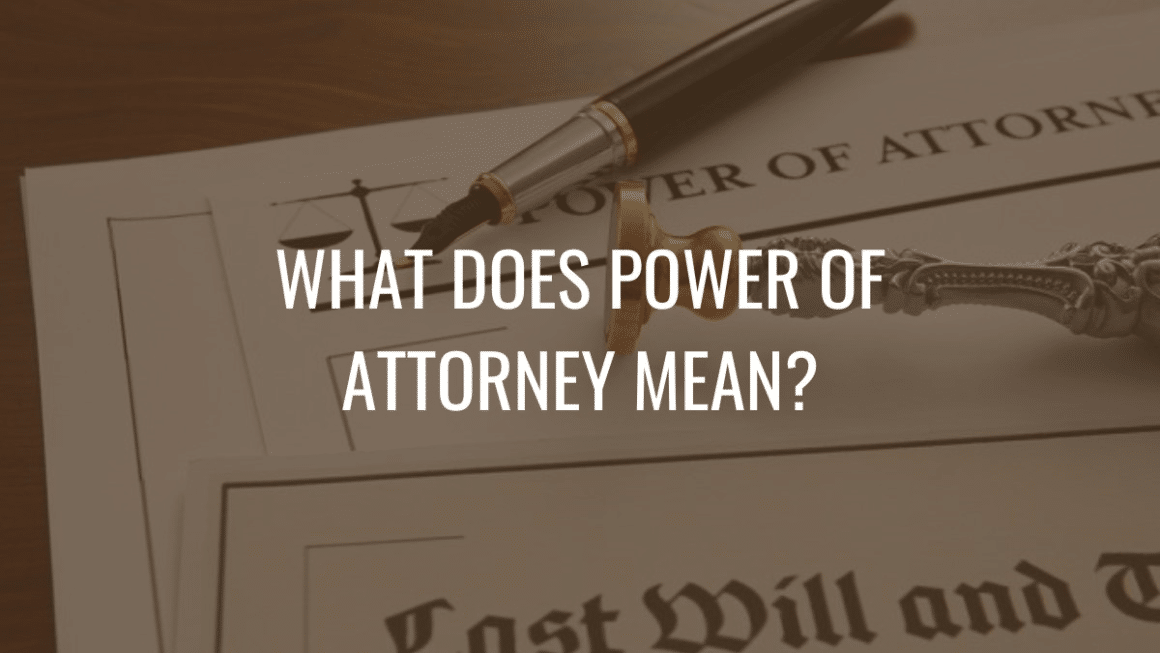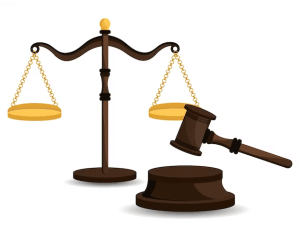A power of attorney (POA) is a legal document that enables one person (the principal) to designate another person or organization (the agent or attorney-in-fact) to represent them in a variety of legal and financial situations. Continue reading to get to know about what power of attorney means.
What does power of attorney mean? Essentially, a Power of Attorney (POA) empowers one person (the agent) to act on behalf of another (the principal). It’s a crucial legal tool. By granting authority, the agent can undertake various responsibilities, such as managing finances or making healthcare choices. Understanding this tool is vital for individuals and families alike. It safeguards interests and honors wishes, especially during incapacity. In the following sections, we’ll delve into what a Power of Attorney is, its different types, how to create one, and its overarching importance.
This comprehensive guide will not only clarify what a power of attorney means but also shed light on its various types, illustrating how it effectively protects your interests and preferences.
What does power of attorney mean?
What does power of attorney mean? A power of attorney (POA) is a legal document. It enables one person (the principal) to delegate certain decision-making powers to another person or business (the agent or attorney-in-fact). The specific terms and conditions stated in the power of attorney will determine the specific scope of the authority conferred.
Making a power of attorney is a significant legal step. It’s crucial to carefully assess your agent’s qualifications and the extent of their powers. A power of attorney can be an essential tool for managing one’s affairs. It ensures that someone trusted can act on their behalf when necessary.
How many powers of attorney are there?
Here are some common types of powers of attorney:
- General power of attorney: This grants broad authority to the agent to make financial and legal decisions on behalf of the principal.
- Limited (or special) power of attorney: This grants the agent specific and limited authority. The purpose is to carry out certain tasks or make decisions on behalf of the principal.
- Durable power of attorney: This type remains in effect even if the principal becomes incapacitated. Also, if unable to make decisions due to illness or disability.
- Medical power of attorney (health care proxy): This grants the agent the authority to make medical decisions. It is done on behalf of the principal if they cannot do so themselves.
- Springing power of attorney: This type only takes effect under specific conditions specified by the principal, such as incapacitation.
- Financial power of attorney: This focuses on financial matters and allows the agent to manage the principal’s finances, and make financial decisions.
How many powers of attorney can a person have?
There is no precise restriction on how many powers of attorney a person can establish, and they are all permissible. Depending on their unique needs and circumstances, a person may have different numbers and kinds of powers of attorney. A person may have several powers of attorney in the following situations:
- Financial power of attorney: A person can appoint one for general financial matters and another for specific transactions.
- Healthcare power of attorney: They may have one for medical decisions and a separate one for end-of-life or specific healthcare matters.
- Durable power of attorney: It can appoint an agent for financial and legal matters during incapacity.
- Limited powers of attorney: People can create these for various purposes, like real estate or business.
- Springing powers of attorney: Many can be activated based on distinct circumstances for different situations.
Power of attorney in Texas: What does power of attorney mean?
Understanding Texas powers of attorney involves several key points:
- Types: Choose a POA type that suits your needs.
- General: Gives broad agent discretion, not automatically durable.
- Durable: Remains effective during incapacity, used for long-term planning.
- Medical: Appoints a healthcare decision-maker when the principal cannot decide.
- Statutory durable: Texas offers a clear, commonly used statutory durable POA.
- Witness and notary: Texas POAs need witnesses and notarization for validity.
- Termination: POAs can end via revocation, specific events, or guardian appointments.
What does power of attorney mean? Power of attorney is a legal term that carries significant weight in the realm of law. It grants an individual the authority to act on behalf of another person in legal, financial, and healthcare matters. In Texas, power of attorney laws play a vital role in ensuring that individuals have a clear understanding of their rights and responsibilities when appointing someone to act as their agent.
Understanding the intricacies of power of attorney can be essential in making informed decisions about one’s finances, medical treatments, and personal affairs. This blog post will delve into the meaning of power of attorney, its significance in Texas, and the various types of power of attorney available under the law. Stay tuned to gain a comprehensive understanding of this crucial legal concept.
Meaning of power of attorney after death
What does power of attorney mean? A power of attorney (POA) becomes invalid upon the principal’s death. A general power of attorney gives the agent wide latitude to manage the principal’s financial and legal affairs. The agent’s powers cease after the principal’s death, and the estate typically enters the probate process (if applicable).
A power of attorney is a legal document that gives someone the authority to act on behalf of another person in financial and legal matters. It is a crucial tool that allows individuals to plan for incapacity or delegate decision-making responsibilities. But what happens to the power of attorney after death? Understanding the implications is essential. When the person who granted the power of attorney passes away, the authority granted to the agent ceases to exist.
However, it is crucial to note that power of attorney is not equivalent to a will. It does not carry over the wishes of the deceased or determine the distribution of assets. To ensure a smooth transition of responsibilities and legal matters after death, it is recommended to consult legal professionals and estate planning experts. They can guide you through the necessary steps to handle the deceased person’s affairs properly. By knowing and understanding the meaning of power of attorney after death, you can make informed decisions and safeguard your interests.
The power of attorney in a will: What does power of attorney mean?
Here’s how a power of attorney and a will relate to each other:
1. Power of Attorney (POA)
An official document known as a power of attorney enables one person. It is called the principal. The delegated authority to another person/organization is known as the agent or attorney-in-fact. It acts on their behalf in a variety of legal and financial situations. The agent appointed under a power of attorney can make decisions and act as specified in the document. Still, this authority usually ends if the principal becomes incapacitated or upon their death.
2. Will
Contrarily, a will is a legal document that states a person’s intentions about the division of their property. It is the selection of an executor to oversee the administration of their estate following their passing.
Here are a couple of scenarios in which a will might mention a power of attorney:
Executor’s authority
A testator may specify in their will that the executor they appoint should have the authority to act as their agent. It should be under an existing power of attorney, particularly if they become incapacitated before their death. This ensures the same person can continue handling their financial and legal affairs.
Agent for specific purposes
A testator may mention their power of attorney to designate their agent under the power of attorney. It helps to carry out specific tasks related to the estate. For example, they may authorize their agent to sell certain assets or make decisions about financial matters after their death.
How does power of attorney work?
Here’s how a power of attorney generally works:
1. Creation of a power of attorney
The process begins with the principal creating and executing a power of attorney document.
2. Agent’s role
The agent is the person the principal chooses to carry out specific tasks or make decisions on their behalf.
3. Execution and formalities
To be legally binding, a power of attorney typically requires signing, notarization, and compliance with state or country laws. Compliance is crucial because requirements may vary by jurisdiction.
4. Effective date
The power of attorney can take effect immediately or upon specified events or conditions in the document. For instance, a durable power of attorney takes effect immediately. On the other hand, a springing power of attorney only activates when the principal becomes incapacitated.
5. Agent’s actions
Once the POA is in effect, the agent can act on behalf of the principal. It is done within the scope of the authority granted. This can include managing the principal’s finances, making legal decisions, signing documents, and handling various other matters as specified.
6. Accountability and fiduciary duty
Agents are bound by a fiduciary obligation and must operate in the principal’s best interests. This requires them to avoid conflicts of interest and make choices. Also, to take measures that are in the principal’s best interests.
7. Termination
The power of attorney can be terminated in several ways. It includes revocation by the principal. It also includes the occurrence of a specified event or condition or the expiration of its stated duration.
8. Record-keeping
Agents are typically required to keep records of their actions and transactions carried out on behalf of the principal. This helps ensure transparency and accountability.
A power of attorney is a powerful legal document. Therefore, the principal should carefully choose their agent and define their authority. Additionally, the principal retains the right to revoke or modify the POA if they can legally do so.
The dual power of attorney: What does power of attorney mean?
A power of attorney document naming two different people as agents is a dual power of attorney. All agents share the ability to act on behalf of the principal and may have specific tasks and obligations.
There are a few common scenarios in which a dual power of attorney might be used:
- Co-agents: Sometimes, the principal may appoint two individuals to serve as co-agents with equal authority.
- Successor agents: A dual power of attorney may involve one primary agent and one or more successor agents.
- Specific roles: In some situations, a dual power of attorney document may assign specific roles or responsibilities to each agent.
It’s important to clearly specify each agent’s roles, responsibilities, and decision-making authority in the power of attorney document. This helps avoid conflicts and confusion regarding their respective powers and responsibilities.
Dual powers of attorney can provide flexibility and additional safeguards for the principal.
Power a power of attorney has: What does power of attorney mean?
The specific terms in the POA document define a power of attorney (POA).
Common POA powers include:
- Legal and financial decisions, like managing finances, contracts, real estate, and taxes.
- Healthcare choices during incapacity.
- Limited to specific transactions or purposes.
- Asset management, including buying and selling assets.
- Business operations for business owners.
- Personal and family issues.
- Government benefits management.
The POA language determines agent powers, and the principal can set limits and conditions.
What does power of attorney mean? A power of attorney holds significant importance in legal matters. It grants someone the authority to act on behalf of another person in various situations, such as financial or medical decisions. Understanding the power a power of attorney has can safeguard your interests and provide peace of mind.
Whether you are planning for the future or facing unexpected circumstances, a power of attorney ensures that your affairs are managed by a trusted individual. It is crucial to establish clear directions and choose a reliable agent who will handle your affairs in line with your wishes. With the power of attorney, you can navigate legal complexities with confidence, knowing that your best interests are protected.
A durable power of attorney in Florida: What does power of attorney mean?
Here are some key features and considerations regarding a durable power of attorney in Florida:
- Durable vs. non-durable: In a non-durable power of attorney, the authority granted to the agent typically ends if the principal becomes incapacitated. In contrast, a durable power of attorney states that the agent’s authority continues even if the principal becomes incapacitated.
- Statutory form: Florida has a statutory form for durable powers of attorney provided in the Florida Statutes.
- Agent’s authority: The agent’s powers and responsibilities are defined in the DPOA document. Florida law lists powers, but the principal can customize the document to specify granted powers and circumstances.
- Capacity assessment: To activate a DPOA, a qualified healthcare provider’s determination of the principal’s incapacity is often required. This helps ensure that the agent’s powers are activated only when necessary.
- Witnesses and notary requirements: The DPOA document must be signed by the principal, two witnesses, and a notary public. This is important for it to be legally valid in Florida. The witnesses must not be individuals designated as agents or healthcare providers for the principal.
- Revocation: The principal can revoke a durable power of attorney at any time, as long as they can do so.
- Agent’s fiduciary duty: Agents appointed under a DPOA must act in the principal’s best interests and avoid conflicts.
Consult an attorney in Florida to create a durable power of attorney that complies with state laws. It should reflect your intentions accurately. Durable powers of attorney are valuable tools for financial and legal planning, especially when there’s concern about potential future incapacity.
Conclusion
In this article, we’ve addressed a question: what does power of attorney mean? A power of attorney empowers individuals to plan for unexpected events. It ensures their wishes are followed, even in incapacity. Whether for finances, healthcare, or other responsibilities, a well-drafted power of attorney is crucial. Understanding its significance and seeking professional guidance empowers individuals to navigate uncertainties with confidence.




